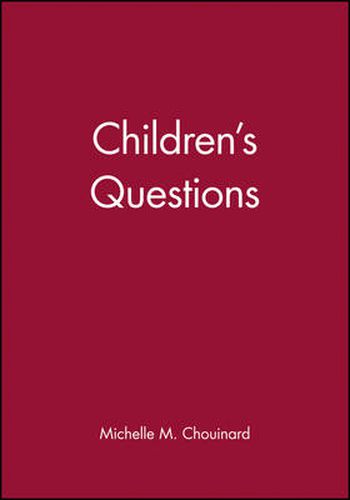Readings Newsletter
Become a Readings Member to make your shopping experience even easier.
Sign in or sign up for free!
You’re not far away from qualifying for FREE standard shipping within Australia
You’ve qualified for FREE standard shipping within Australia
The cart is loading…






This Monograph examines the role that children’s questions play in their cognitive development. When children encounter a problem with their current knowledge state (a gap in their knowledge, some ambiguity they don’t know how to resolve, some inconsistency they’ve detected), asking a question allows them to get targeted information exactly when they need it. This information is available to them when they are particularly receptive to it, and since it comes as a result of their own disequilibrium, it may have depth of processing benefits. In that questions allow children to get information they need to move their knowledge structures closer to adult-like states, the ability to ask questions to gather needed information constitutes an efficient mechanism for cognitive development. The studies presented here indicate that children ask information-seeking questions that are related in topic and structure to their cognitive development (usually). Parents give answers to these questions, but when they don’t, the children persist in asking for the information, which suggests that the goal of this behavior is to recruit needed information. The content of these questions shifts within exchanges and over the course of development in ways that reflect concept building. Finally, children generate questions efficiently in order to gather needed information, and then are able to use this information productively; they tap into their existing conceptual knowledge in order to do this. Thus, the ability to ask questions is a powerful tool that allows children to gather information they need in order to learn about the world and solve problems in it.
$9.00 standard shipping within Australia
FREE standard shipping within Australia for orders over $100.00
Express & International shipping calculated at checkout
This Monograph examines the role that children’s questions play in their cognitive development. When children encounter a problem with their current knowledge state (a gap in their knowledge, some ambiguity they don’t know how to resolve, some inconsistency they’ve detected), asking a question allows them to get targeted information exactly when they need it. This information is available to them when they are particularly receptive to it, and since it comes as a result of their own disequilibrium, it may have depth of processing benefits. In that questions allow children to get information they need to move their knowledge structures closer to adult-like states, the ability to ask questions to gather needed information constitutes an efficient mechanism for cognitive development. The studies presented here indicate that children ask information-seeking questions that are related in topic and structure to their cognitive development (usually). Parents give answers to these questions, but when they don’t, the children persist in asking for the information, which suggests that the goal of this behavior is to recruit needed information. The content of these questions shifts within exchanges and over the course of development in ways that reflect concept building. Finally, children generate questions efficiently in order to gather needed information, and then are able to use this information productively; they tap into their existing conceptual knowledge in order to do this. Thus, the ability to ask questions is a powerful tool that allows children to gather information they need in order to learn about the world and solve problems in it.